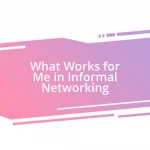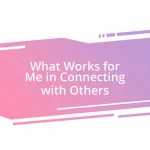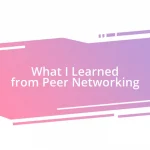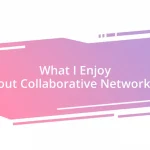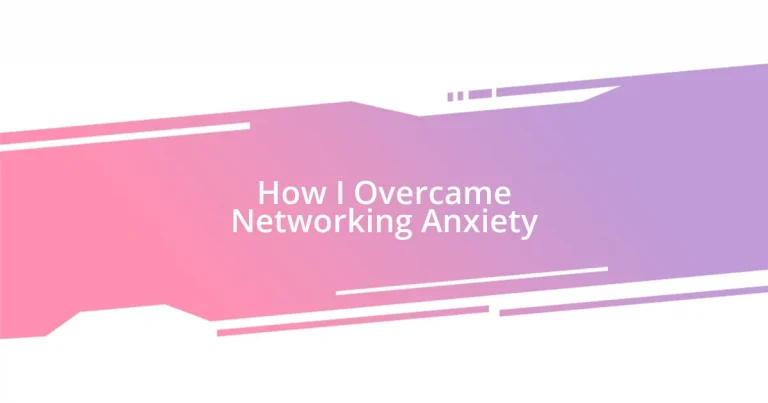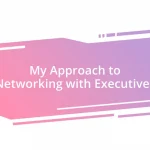Key takeaways:
- Networking anxiety is common and often arises from fears of judgment; connecting with others can help ease these feelings.
- Identifying personal triggers, such as crowd size and conversation topics, enables better management of anxiety in networking situations.
- Following up after networking events is crucial for solidifying connections, and celebrating small wins boosts confidence and motivation.
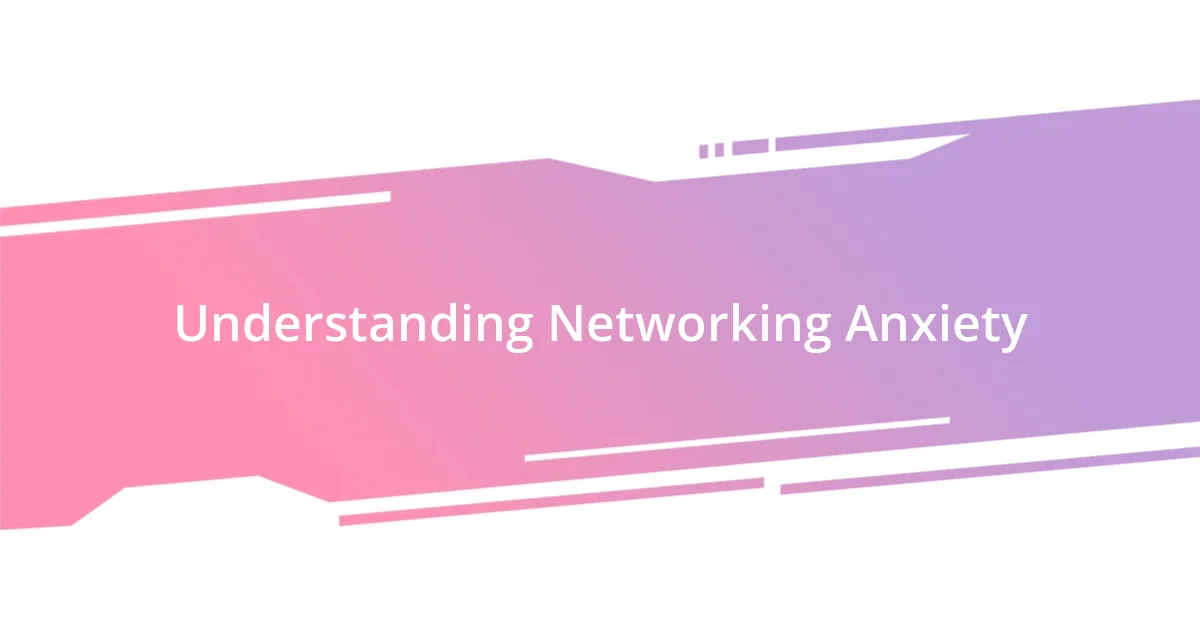
Understanding Networking Anxiety
Networking anxiety can feel like an overwhelming fog that clouds your mind just before a big event. I remember standing in the corner of a crowded room, heart racing, convinced that everyone was judging me for not approaching anyone. It’s a paralyzing feeling, isn’t it?
At its core, networking anxiety often stems from a fear of judgment or rejection. I recall a particularly daunting moment when I was invited to a professional workshop and almost backed out, dreading the thought of striking up conversations. How many times have you felt that irresistible urge to escape rather than face the uncertainty of a social interaction?
Understanding that this anxiety is common can be comforting. I’ve found solace in connecting with others who share similar struggles; it made me realize we’re often our own worst critics. Sharing experiences and laughs about the awkwardness of networking can transform dread into camaraderie, helping to ease that anxious grip.
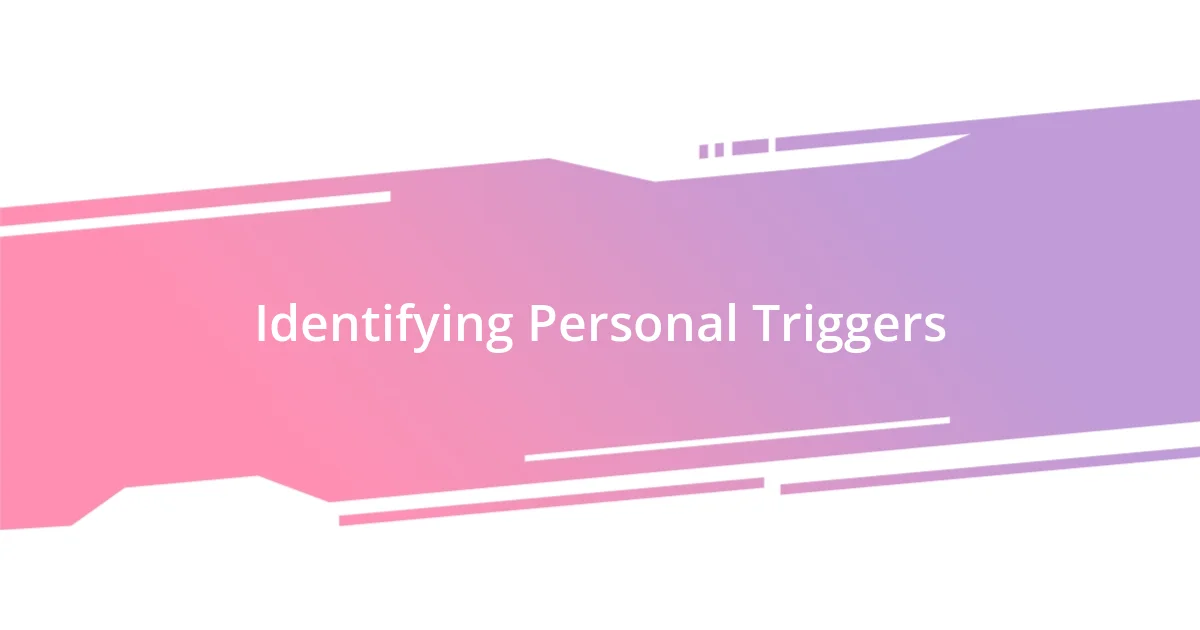
Identifying Personal Triggers
Identifying personal triggers is crucial for managing networking anxiety. For me, understanding that certain environments exacerbate my feelings was a game changer. I remember attending an industry conference where the sheer size of the crowd felt overwhelming—I realized that bustling spaces with lots of unfamiliar faces particularly heightened my anxiety.
To pinpoint your triggers, consider the following:
- Crowd Size: Do you feel more anxious in large groups versus smaller gatherings?
- Setting: Are there specific venues or atmospheres that make you more uncomfortable?
- Topics of Conversation: Certain subjects might leave you feeling more vulnerable or less confident.
- Past Experiences: Reflect on previous networking events to identify instances that caused heightened anxiety.
- Body Language of Others: Do you find yourself interpreting others’ body language as judgmental, and does this affect how you approach them?
Engaging with these factors can empower you to navigate networking situations more strategically. I’ve learned to prepare for these triggers and modify my approach, which has made a significant difference in my experience.
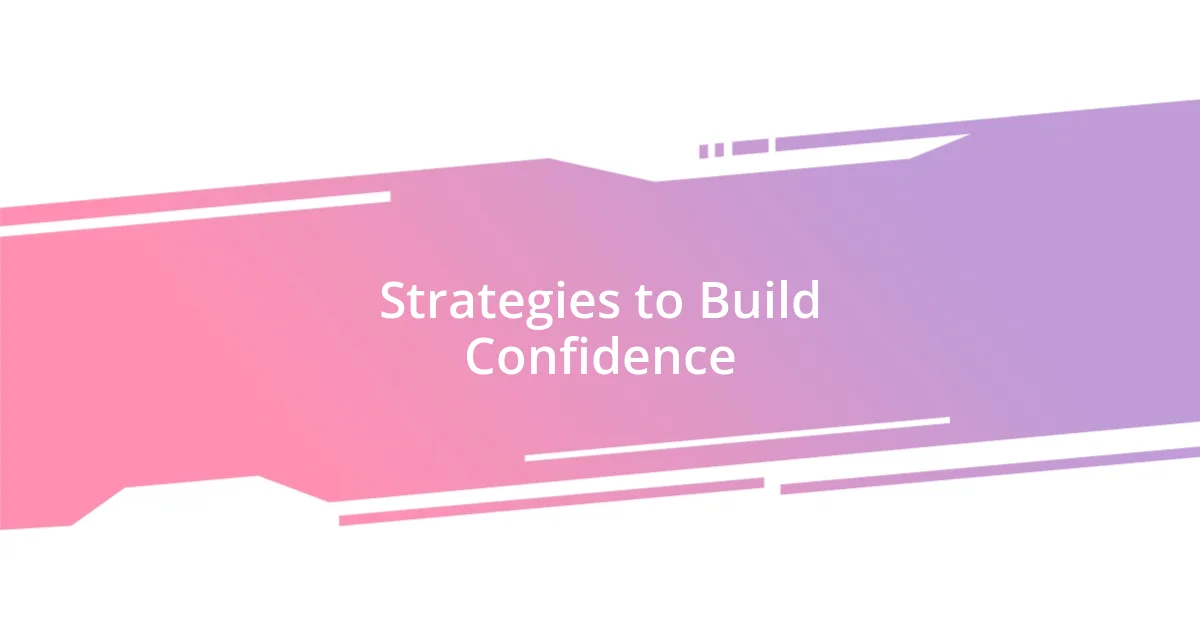
Strategies to Build Confidence
One of the most effective strategies I’ve found for building confidence is to practice active listening. I remember attending a networking event where I decided to focus more on what others were saying rather than worrying about what I would say next. This shift allowed me to engage genuinely, leading to insightful conversations that flowed naturally. Have you ever noticed how people appreciate someone who listens? It lightens the pressure on you, turning the interaction into a shared experience.
Another powerful approach is to set achievable goals before entering a networking situation. For instance, during my early networking days, I aimed to initiate just two conversations per event. Starting small helped me build momentum without feeling overwhelmed. I recall celebrating small wins like exchanging contact information, which fueled my confidence for the next interaction.
Visualizing success also plays a crucial role in building confidence. I often take a few moments to imagine a successful conversation before stepping into a networking event. It may sound simple, but envisioning myself engaging positively and confidently makes a significant difference. The brain is a powerful tool—what you project can sometimes dictate the reality you experience.
| Strategy | Description |
|---|---|
| Active Listening | Focusing on others to create genuine connections. |
| Setting Achievable Goals | Establishing small targets to gradually build confidence. |
| Visualizing Success | Imagining positive interactions to influence outcomes. |
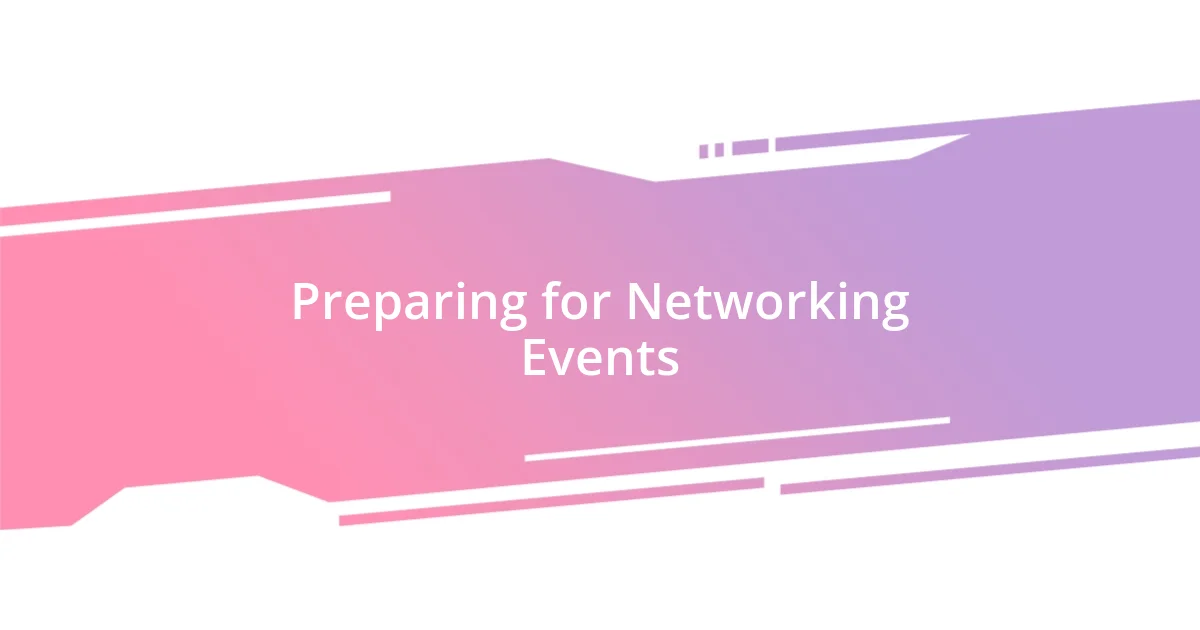
Preparing for Networking Events
I find that preparing for networking events goes beyond just picking an outfit; it’s about mindset. I usually take a few moments the night before to map out my plan. I’ll jot down a couple of key points about my professional experiences and interests, which gives me a solid talking point if I hit a conversational lull. Have you ever felt your mind go blank in a crowded room? Having those notes makes it easier to stay engaged and minimizes the panic of forgetting what to say.
To further ease my anxiety, I’ve started to visualize the event in my mind. Picture this: I’m imagining myself entering the venue with confidence, shaking hands, and laughing while discussing shared interests. That mental rehearsal can do wonders! When I finally arrive, I feel a bit like I’ve already been there, and it makes everything less intimidating.
Another tactic I use is to connect with someone I know beforehand. It’s amazing how a familiar face can ground you. I recall one event where a colleague and I agreed to meet up, which completely shifted my mood. Instead of entering alone, I walked in with someone who made me feel supported. What if you arranged to meet a friend before your next event? I promise it can be a game-changer.
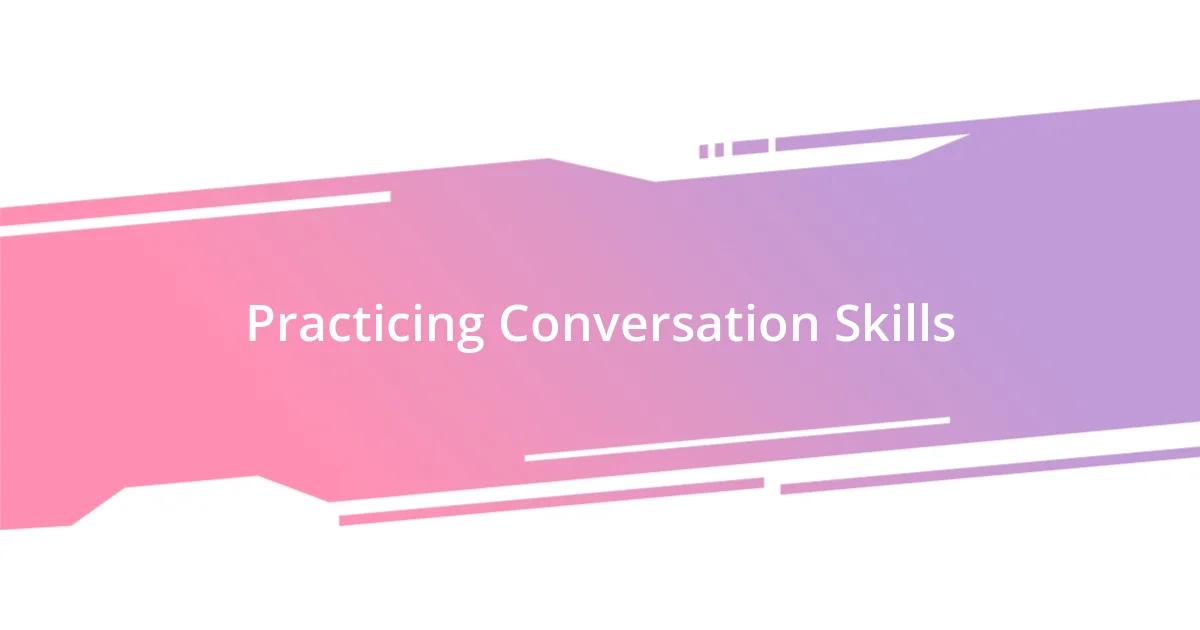
Practicing Conversation Skills
Practicing conversation skills requires an exploration of both our verbal and non-verbal cues. I remember a moment at a conference when I decided to focus not just on the words, but also on my body language. When I stood tall and made eye contact, the responses were far more positive, and I felt like I was genuinely connecting. Have you ever felt the energy shift simply by the way you hold yourself? It’s remarkable how much that can influence a conversation.
Another technique I’ve found beneficial is role-playing with a trusted friend. We would sit down and take turns practicing different networking scenarios, which felt a bit awkward at first but ultimately rewarding. One day, my friend pretended to be a corporate executive, and I had to pitch my ideas. By the end of our practice session, I felt more poised and ready to tackle real conversations. Could you imagine how comfortable you might feel after rehearsing those tricky introductions before stepping into a new environment?
Lastly, I began keeping a journal to reflect on my conversations after networking events. Writing down what went well and what could be improved has been a game changer. I recall one event where I stumbled over my words, but by documenting it, I could track my progress and recognize patterns in what made me anxious. Have you ever considered how journaling could help refine your skills? It turns out, reflecting on our experiences is a powerful tool for growth.
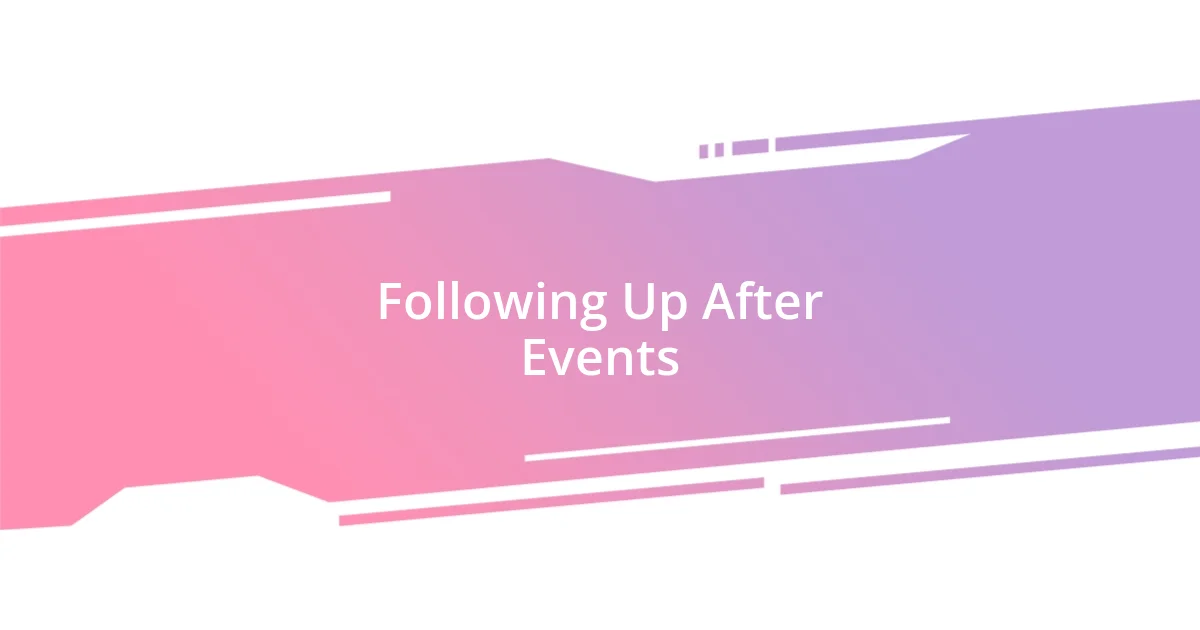
Following Up After Events
Following up after networking events can feel daunting, but I’ve learned it’s a crucial step in solidifying those connections. A few days post-event, I like to send a short, personalized email to the people I met. I’ll mention something specific from our conversation—maybe a shared interest or a recommendation they made. This touchpoint not only reminds them of our discussion but also shows that I genuinely care about our connection. Have you ever noticed how a small detail can make a big difference?
There was one instance when I followed up with someone I had a fantastic chat with about sustainable business practices. In my email, I referenced a book they suggested. A week later, they responded with even more insights, and we ended up discussing a potential collaboration! It’s a great reminder that those brief encounters can lead to meaningful opportunities if you nurture them. Have you ever thought about what great conversations could blossom when you take that extra step?
Sometimes I also find it helpful to connect on social media platforms after an event. When I receive a connection request alongside a personal message, it feels less formal and more inviting. Just last month, I connected with a fellow entrepreneur on LinkedIn, and we ended up sharing resources that benefited both our businesses. Have you considered the power of digital spaces in maintaining those initial sparks? It really amplifies the potential for collaboration and growth in a way I hadn’t realized before.
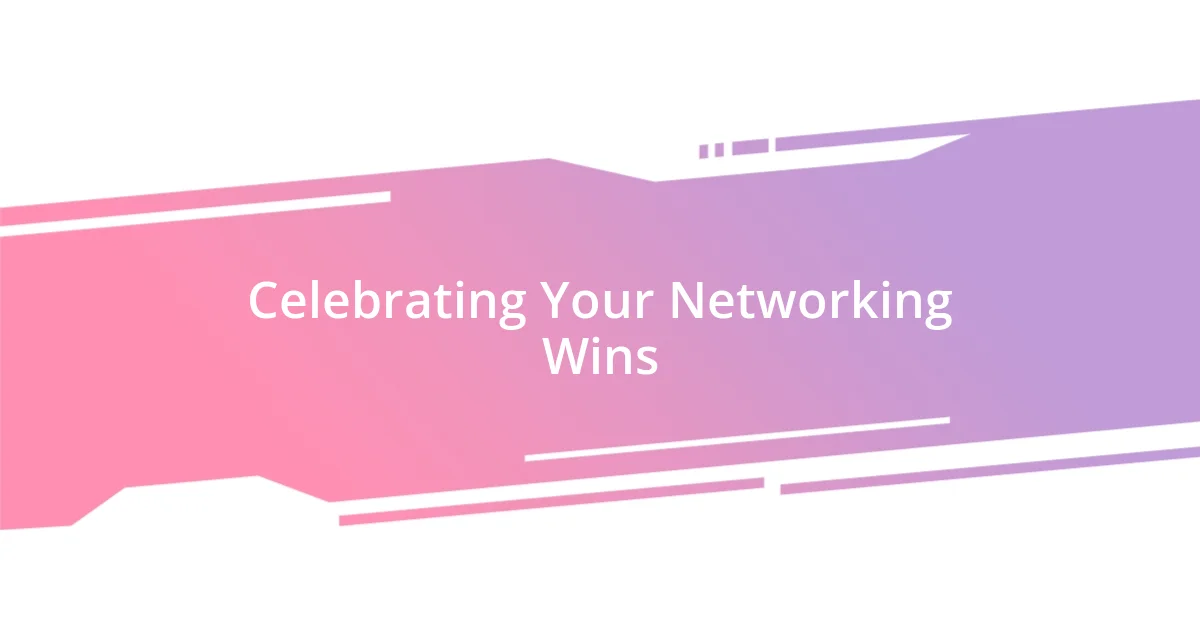
Celebrating Your Networking Wins
Celebrating networking wins is essential for building confidence and motivation. I still remember the rush of joy when I received my first invitation to collaborate after a networking event. The feeling was exhilarating, validating all my efforts and anxieties I previously faced—thank you, courage! Have you ever had that moment when you realized that your hard work truly paid off?
I’ve also started setting small milestones for myself. For example, I would celebrate simply starting a conversation with someone new. After the event, I’d treat myself to something I genuinely enjoy, like a favorite snack or an outing. These rituals not only mark my progress but also remind me to enjoy the journey. Have you reflected on how rewarding it is to recognize the little victories along the way?
Moreover, sharing my successes with friends plays a significant role in my networking experience. When I confided in a close friend about a great connection I made, their excitement amplified my achievement tenfold. It’s amazing how having someone else to celebrate with can enhance the joy of those moments. How do you celebrate your networking wins? It’s these shared experiences that keep us motivated and connected in our networking journeys.


